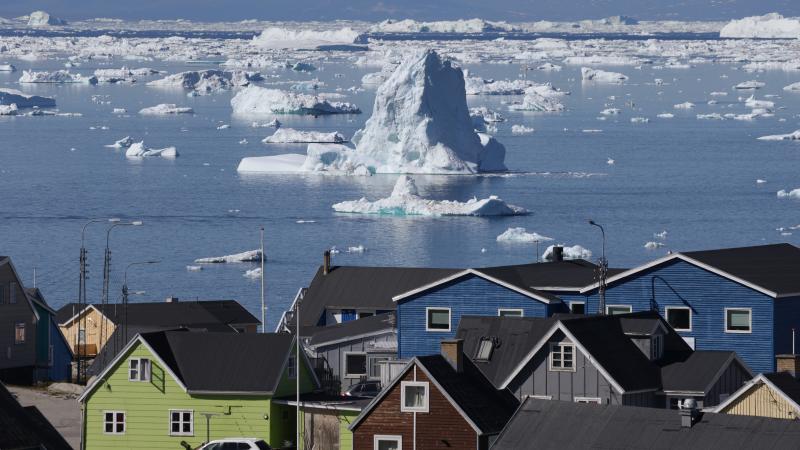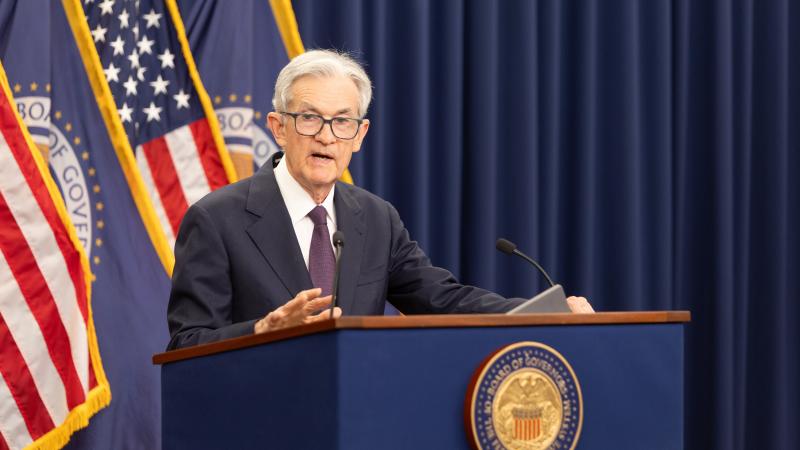Houthis disappeared from headlines after US air strikes, but group still targeting Red Sea shipping
Publicly available ship tracking data currently reveals a discernibly thin amount of traffic through the Red Sea, which largely appears limited to tankers and other cargo vessels.
U.S. and UK naval forces earlier this year attempted to flex their might in the Red Sea against the Iran-backed Houthi militants in response to their targeting of commercial shipping in the critical waterway.
Throughout much of January and February, outlets repeatedly ran headlines of Western strikes on Houthi territory aimed at curtailing the group's harassment of merchant ships. Yet just two months later, the Houthis remain active and have conducted multiple strikes in recent weeks.
Early Monday morning, a suspected Houthi strike resulted in what the United Kingdom Maritime Trade Operations center described as “an explosion in close proximity to a merchant vessel,” the Associated Press reported.
While some vessels continue to brave the waterway even in the face of a possible Houthi attack, most commercial ones are opting to take the long way around the Cape of Good Hope.
Who are the Houthis?
The group is one of three primary factions in the ongoing Yemeni civil war. Comprised mostly of Shia radicals, the group stands in opposition to the official Yemeni government and the Southern Transitional Council.
The Houthis control a large swathe of Yemeni territory along the Red Sea Coast, including parts of the border with Saudi Arabia. Less than one month after President Joe Biden took office in 2021, he officially delisted the group as a Foreign Terrorist Organization. Washington ultimately restored that designation in January as the group’s activities drew global attention.
The group has officially categorized its harassment of Red Sea shipping as an effort to pressure Israel to end its ongoing conflict with Hamas in the Gaza Strip. Israel Defense Forces (IDF) has attempted to oust Hamas from power in response to an Oct. 7, 2023, raid on its territory. Fighting has persistently with only limited humanitarian pauses for months.
Efforts to quell their activities
The group’s attacks prompted vows last December of “appropriate action” by the U.S., which had already positioned vessels to intercept missile and drone attacks in the area.
U.S. Navy helicopters in December intervened in defense of a Singapore-flagged vessel and sank three Houthi ships in the affair.
In mid-January, the U.S. and UK conducted direct strikes on Houthi territory as part of what U.S. Central Command (CENTCOM) described as an effort to “protect freedom of navigation and prevent attacks on U.S. and partner maritime traffic in the Red Sea.”
"These strikes, along with other actions we have taken, will degrade the Houthi’s capabilities to continue their reckless attacks on international and commercial shipping in the Red Sea, the Bab-el-Mandeb Strait, and the Gulf of Aden," CENTCOM declared at the time.
Central Command had yet to respond to Just the News' request for comment before this story was posted.
Efforts to target the Houthis persisted, with coalition forces conducting major strikes on Houthi targets throughout February.
Notably, the Houthis continued to conduct some degree of effective operations, striking the cargo ship MV Rubymar in late February, which ultimately sank in March. Just days after the Rubymar sunk, moreover, the Houthis struck the MV True Confidence, resulting in the first civilian casualties of the entire affair. Three crewmembers died in that attack.
Speaking to Just the News, former Trump Deputy National Security Advisor and Heritage Foundation Vice President for National Security and Foreign Policy Victoria Coates suggested that Washington's response was limited by a lack of congressional authorization to actively target the Houthis.
“I think unfortunately the Biden administration is using purely defensive tactics which in a way they have to because they really don’t have an authorization for use of force against the Houthis," she said. "You can say it's an emergency and that the president has constitutional authority to defund the nation. So, you can do defensive strikes against the Houthis for as long as you want ... but that's not going to be successful."
"We did degrade some of their capacity," she conceded of the impact of American strikes on the Houthis, before contending that the toll on resources largely resulted in the Iranians needing "a little more time" to resupply them.
Prosperity Guarded?
Defense Secretary Lloyd Austin in December announced the start of Operation Prosperity Guardian, the multinational effort to secure the Red Sea and safeguard commercial shipping.
Despite the official support of many nations, the U.S. has struggled to secure tangible aid from even some of its NATO allies, with French and Italian forces committing to only limited roles.
Other nations have been far more reluctant to commit to publicly backing the coalition, with Spain, for example, distancing itself from the entire affair upon the operation’s announcement, Reuters reported at the time.
The European Union opted to pursue its own naval mission in the Red Sea, launching the operation in mid-February.
“The European Union is responding swiftly to the necessity to restore maritime security and freedom of navigation in a highly strategic maritime corridor,” High Representative of the European Union for Foreign Affairs and Security Policy Josep Borrell said at the time, also according to Reuters.
Coates called the Biden administration's coalition to address the Houthis "very fractured" and contrasted it with a comparable coalition under the Trump administration.
"We had put together a maritime security coalition in 2018-2019 timeframe … It was pretty effective and we had UAE and Bahrain supporting … and that actually worked pretty well," she contended. "This does not seem as focused … [which] could be because it is so exclusively defensive."
Shipping remains effectively blocked
Publicly available ship tracking data currently shows a discernibly thin amount of traffic through the Red Sea that largely appears limited to tankers and other cargo vessels. Shipping lanes approaching the Cape of Good Hope, meanwhile, appear to have noticeably greater traffic.
In early March, the International Monetary Fund warned of major disruptions in global trade due to the harassment of Red Sea shipping.
Roughly 15% of global shipping passes through the Suez Canal and, consequently, through the Red Sea.
The IMF, in particular, highlighted the drop in shipping volume through the canal from Dec. 25, 2023, into early March. On Christmas Day, roughly 4.12 million metric tons of trade volume went through the waterway, compared to 1.82 million on March 4. Those numbers reflect a roughly 50% drop over the same period in the year prior.
By contrast, the Cape of Good Hope had an uptick – from 4.41 million to 7.63 million – in the same period. Taking the long route, the IMF noted, increased delivery times by an average of 10 days or more.
Seeking to get around the lengthy delivery delays, many shipping firms have turned to air deliveries. Reporting from the Wall Street Journal earlier this month pointed to an uptick in activity at key hubs linking Asia and Europe such as Dubai.
The International Air Transport Association, moreover, documented a 39.3% increase in Middle East-Europe trade in February over the prior year.
Potentially indicative of broader industry sentiment is a statement from Maersk in late March on the prospect of resuming Red Sea voyages.
“Regretfully, both our internal analysis, as well as insight we received from external sources, still indicates that the risk level in the region remains elevated,” the statement read. “We have seen attacks on commercial vessels increase in numbers, including the tragic attack on the vessel True Confidence, which resulted in the death of three crew members, and the sinking of the vessel Rubymar, which is posing a serious environmental risk."
The statement also reads, "At Maersk, we are aware that some other shipping lines have continued sailing through the Red Sea despite security risks or have announced their plans to resume sailing. We respect the right of each carrier to make such decisions individually.
"At the same time, we continue with our own assessment that current situation does not allow us to make a similar decision and with thus still believe that sailing via the Cape of Good Hope and around Africa is the most reasonable solution at the moment and the one that currently allows the best supply chain stability."
The path forward
In her remarks to Just the News, Coates also pointed to the absence of an Authorized Use of Military Force (AUMF) from Congress permitting the president to pursue Iranian proxies such as the Houthis, Hezbollah and Hamas.
She contended that the existing limitations on use of force barring congressional authorization would likely preclude a successful deterrence and further asserted that the administration's approach to the effort was the product of "a very different worldview."
"They still hope that they could get to some revision of the Iranian nuclear deal," she asserted, adding that administration officials are "hoping the Iranians will rein in Hezbollah, and the Houthis, and Hamas."
Coates, however, doubted that "anything but a complete disruption in their own supply chains would persuade" Tehran to pursue such an option.
"The president campaigned on ending the war in Yemen. Well, that hasn't happened," she said. "They can come to Congress and get [an AUMF] ... [but] it would shock me in an election year if they actually did."
Ben Whedon is an editor and reporter for Just the News. Follow him on X, formerly Twitter.
The Facts Inside Our Reporter's Notebook
Links
- conducted
- multiple strikes
- reported
- restored that designation
- appropriate action
- intercept missile
- intervened
- direct strikes
- declared
- major strikes
- throughout February
- MV Rubymar
- civilian casualties
- French and Italian forces
- reported
- said
- ship tracking data
- International Monetary Fund
- Wall Street Journal
- read
- X, formerly Twitter














